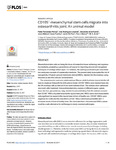CD105+-mesenchymal stem cells migrate into osteoarthritis joint: an animal model

Ver/Abrir
Use este enlace para citar
http://hdl.handle.net/2183/19958
Excepto si se señala otra cosa, la licencia del ítem se describe como Creative Commons Attribution 4.0 International License (CC-BY 4.0)
Colecciones
- Investigación (FCS) [1293]
Metadatos
Mostrar el registro completo del ítemTítulo
CD105+-mesenchymal stem cells migrate into osteoarthritis joint: an animal modelAutor(es)
Fecha
2017-11-30Cita bibliográfica
Fernandez-Pernas P, Rodríguez-Lesende I, de la Fuente A, Mateos J, Fuentes I, De Toro J, Blanco FJ, Arufe MC. CD105+-mesenchymal stem cells migrate into osteoarthritis joint: an animal model. PLoS One. 2017 Nov 30;12(11):e0188072.
Resumen
[Abstract] Mesenchymal stem cells are being the focus of connective tissue technology and regenerative medicine, presenting a good choice cell source for improving old and well recognized techniques of cartilage defect repair. For instance, the autologous chondrocyte transplantation using new concepts of regenerative medicine. The present study investigated the risk of xenogenicity of human synovial membrane-derived MSCs, injected into the monkeys using intravenous and intra-articular administration. The animal models used were adult monkeys Rhesus which had been injured into the left knee to create an Osteoarthritis (OA) animal model. CD105+-MSCs were injected twice into the OA monkeys with an interval of one week between them. The animals were euthanized one month after treatment. Immunohistochemistry analysis of different organs: spleen, heart, fat, liver, gut, pancreas, lung, skeletal muscle and kidney from the animals revealed that CD105+-MSCs migrated towards the injured knee joint. MSCs naive were found statistically significant increased in the injured knee in front of healthy one. CD105+-MSCs were negatives for CD68 and the area where CD105+-MSCs were found presented SDF-1 increased levels in front of healthy knee. We concluded that a characterized MSCs subset could be a safe alternative for cell therapy in clearly localized pathologies.
Palabras clave
Endoglin
Macaca fascicularis
Mesenchymal stromal cells
Osteoarthritis
Macaca fascicularis
Mesenchymal stromal cells
Osteoarthritis
Versión del editor
Derechos
Creative Commons Attribution 4.0 International License (CC-BY 4.0)
ISSN
1932-6203






